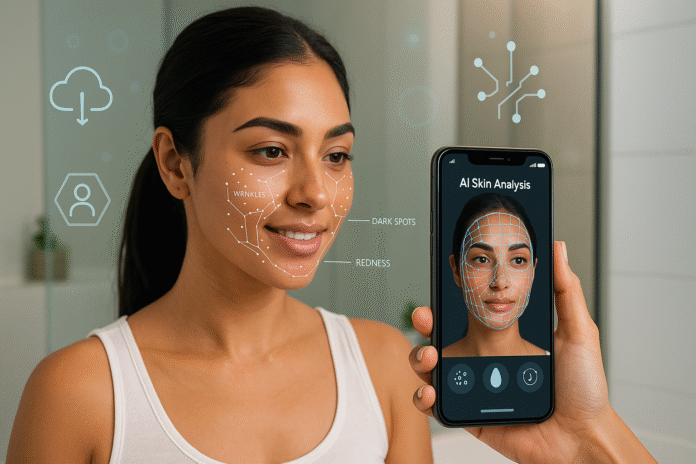Skincare has always been personal. However, by 2025, it has become brilliant. Artificial Intelligence isn’t just recommending moisturisers anymore — it’s scanning hydration levels, mapping protein structures, and even predicting future skin conditions before they surface to recommend the perfect skincare routine.
According to a Reuters analysis, the AI-powered skincare market is projected to surge from $3.27 billion in 2023 to over $8.1 billion by 2028. From selfie-based hydration analysis to robot-blended custom cosmetics, a silent transformation is underway — and it’s redefining beauty routines forever.
But beneath the glossy headlines lies a complex truth: AI isn’t perfect, bias still exists, and your skin data might be more valuable than gold. In this FanalMag deep dive, we explore the technology, science, ethics, and future trends that are shaping skincare in the era of AI.
What Does “AI Skincare Routine” Actually Mean?
AI in skincare refers to technologies that analyse skin data using machine learning, computer vision, and predictive algorithms to offer personalised recommendations.
This includes:
- Skin analysis via smartphone cameras or sensors.
- Personalised product suggestions based on your skin profile.
- Routine tracking and progress reports.
- Real-time environmental adaptations (e.g., weather, pollution).
- Ingredient compatibility detection.
The AI learns about your skin like a dermatologist would—except it works 24/7 and retains all the information.
How AI Reads Your Skin in 2025
Forget one-size-fits-all beauty. AI now delivers hyper-personalisation by analysing skin like a high-resolution map.
L’Oréal’s Cell BioPrint Device
Unveiled at CES 2025, Cell BioPrint utilises microscopic skin tape strips in conjunction with AI-driven protein analysis. It evaluates 1,000+ biomarkers to predict everything from hydration levels to skin elasticity, then recommends precise formulations.
It’s like running a blood test for your skin,Only now, it fits in your hand
says Barbara Lavernos, Deputy CEO of L’Oréal
Currently piloted in Asia, the full-scale rollout is expected in late 2025, pending regulatory approvals.
Haut.AI & Revieve: AI Skin Labs
- Haut.AI works with over 3 million dermatology images to measure more than 200 skin parameters — including pore size, wrinkles, pigmentation, and hydration.
- Revieve, used by global skincare giants, integrates real-time selfie analysis and produces brand-agnostic recommendations tailored to your skin profile.
These tools don’t just suggest products — they’re starting to predict future changes, catching potential dryness, hyperpigmentation, or collagen loss before they appear.
Start With a Skin Scan: AI-Powered Diagnosis Tools
The first step in building a smart skincare routine is understanding your skin. Luckily, you no longer need to visit a clinic. Several apps can now scan your face and generate a detailed report on your skin health. One well-known app that can do this is SkinAI by Perfect Corp.
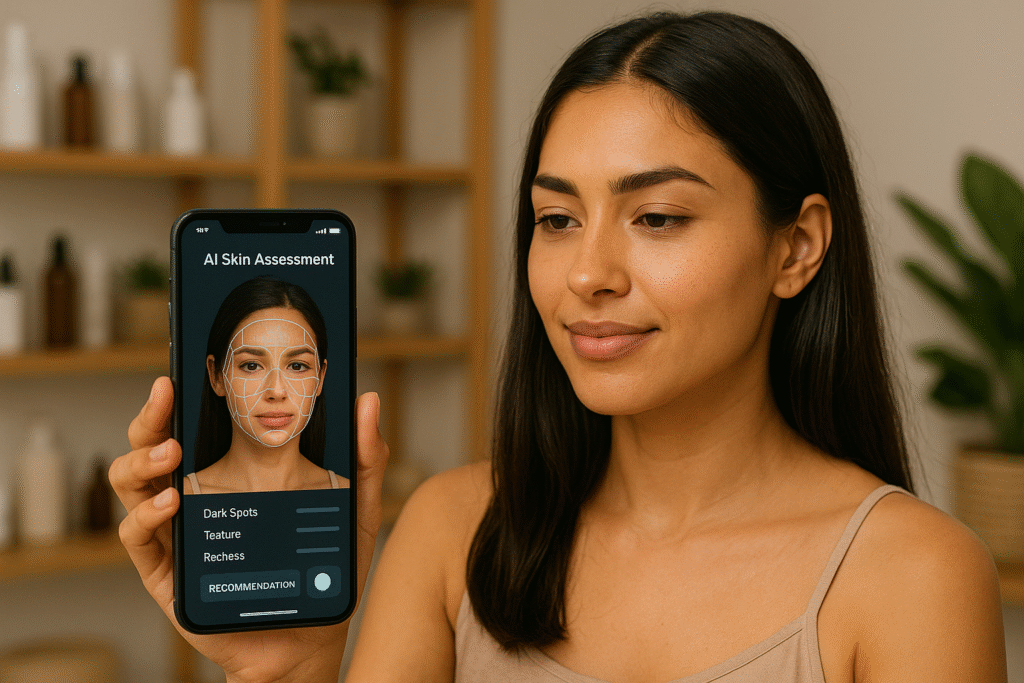
SkinAI by Perfect Corp
SkinAI, built into the popular YouCam Makeup app, utilises AI and AR to scan your skin in real time using just your front-facing camera. It instantly identifies wrinkles, spots, texture, redness, and more.
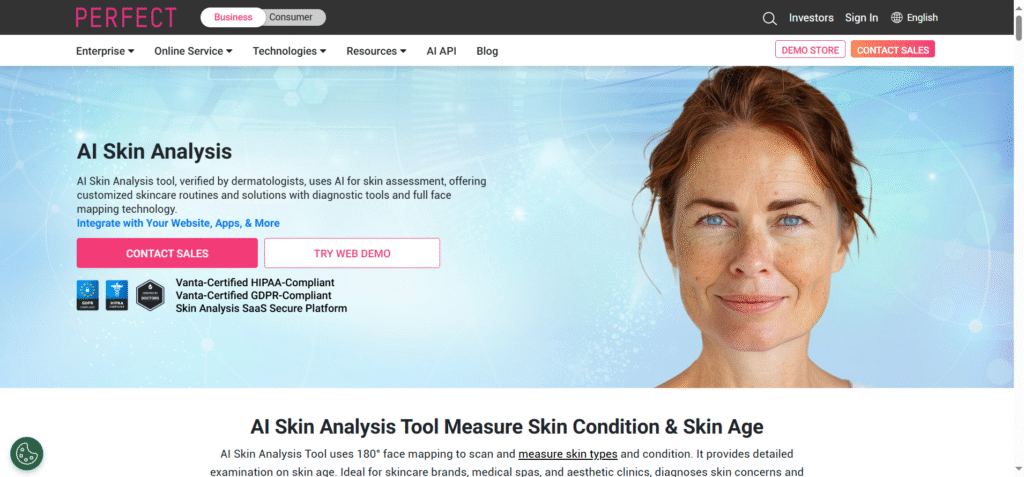
The AI Skin analysis tool measures skin age and utilises 180-degree face mapping to scan and assess various skin types. The Skin analysis tools also recommend skincare products and procedures tailored to your specific skin needs.
Some of the skin conditions that SkinAI can identify include spots, wrinkles, pores, moisture, redness, oiliness, Acne, Dark Circles, and more.
L’Oréal Skin Genius
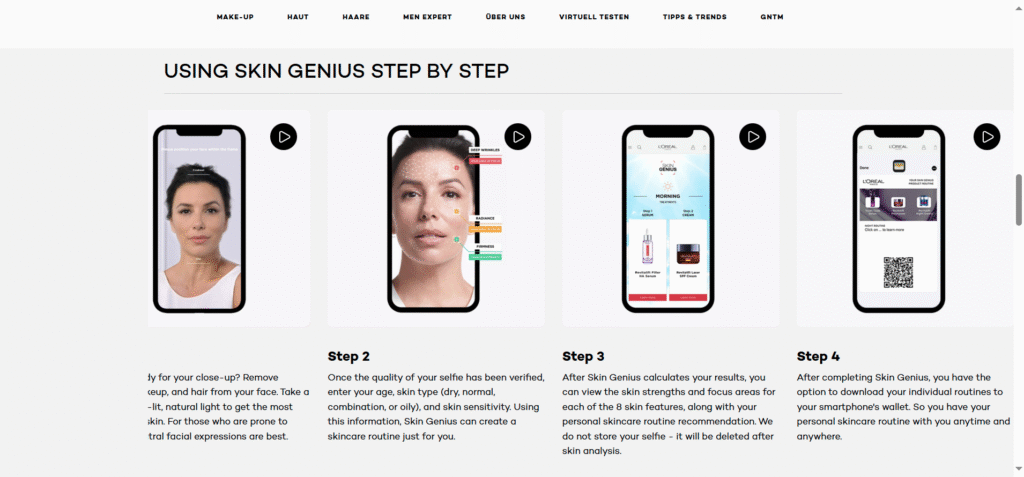
L’Oréal’s Skin Genius is part of their AI-backed push into personalised beauty. You upload a selfie, and the system evaluates hydration, radiance, firmness, and more, offering a whole regimen from their product catalogue.
The app is free and was designed in collaboration with expert dermatologists. The skin scanner technology is based on the same deep-learning algorithms used in medical and dermatological assessment systems.
The Skin Genius app analyses eight attributes: Fine Lines, Eye Wrinkles, Fold, Deep Wrinkles, Strength, Pore Quality, Pigmentation, and Radiance.
- Platform: Web and in-store
- Used by brands: Lancôme, Vichy, La Roche-Posay
Revieve
Utilised by brands such as Ulta, Philips, and Walgreens, it provides branded AI skin analysis and product matching, which is considered essential for an AI skincare routine.
Revieve analyses over 200+ AI health metrics instantly from your selfie. The metrics cover ageing, hydration, pigmentation, T-Zone, Cheek-Zone, and overall skin health, with the option to create custom metrics tailored to brand-specific needs.
There is also a conversational AI assistant that supports users in creating tailored skincare journeys based on their selfies, skin analysis results and personal skin goals.
Roche-Posay SpotScan
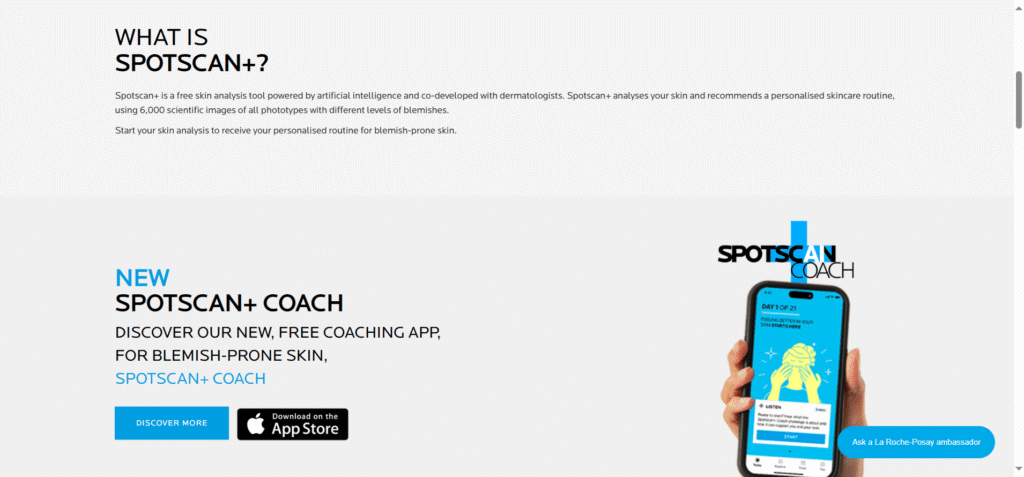
La Roche-Posay’s SpotScan+ Coach is a free, AI-powered skin coaching app designed for individuals with blemish-prone or acne-sensitive skin.
After users download the app on iOS or Android, they start with a 21‑day onboarding challenge intended to establish consistent skincare habits (morning and evening routines) and continue through a three‑month programme with daily check‑ins.
The app leverages AI-driven SpotScan+ technology—trained on over 6,000 dermatologist-approved images across various skin types—to analyse skin conditions via three selfies and generate a personalised La Roche-Posay product routine alongside expert guidance.
“For a deep dive into how AI is reshaping beauty and fashion globally, read our full guide on AI in Beauty: Virtual Try-On Tech & The Future of Fashion.”
Tailoring the Routine: AI Skincare Routine Plans
Once your skin profile is set, AI can build a customised plan, factoring in skin goals (e.g., brighten tone, reduce acne), climate, allergies, and even menstrual cycles. These are the top apps for customising your skincare routine.
Haut.AI
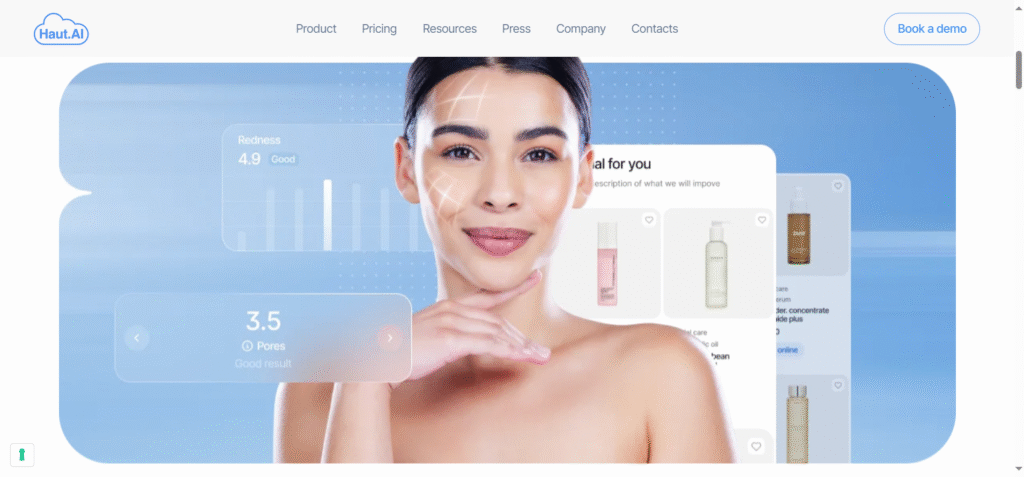
One of the most sophisticated players, Haut.AI, uses over 3 million data points to craft a hyper-personalised skincare routine. It offers brand-agnostic recommendations, so it’s not trying to sell you one product line.
- Used by: Beiersdorf (NIVEA), Ulta Beauty
- Features: Multi-ethnic skin support, ageing predictions, and routine building
- Access: Available through partner beauty retailers and platforms
Atolla (acquired by Function of Beauty)
Atolla utilises a monthly skin quiz, combined with machine learning, to track changes and adjust your serum formula. It’s no longer a standalone product, but it has influenced many custom skincare lines today.
AI + Ingredients: No More Guesswork
Have you ever wondered if niacinamide clashes with your retinol? AI tools now decode ingredient lists like nutrition labels—letting you know what’s safe, effective, or overkill.
INCI Decoder
While not powered by AI in the traditional sense, the INCI Decoder utilises an intelligent engine to explain skincare ingredients based on their chemical structure and intended purpose.
- Why it matters: Helps users understand what’s in their routine
- Bonus: Paired with apps like Skinsort, it enables you to create personalised routines for your skincare.
Beyond Looks: Hydration, Barrier Health & Biometrics
Your skin is an ecosystem — and AI now has the tools to decode it at a molecular level.
Hydration & TEWL Scans via Selfies
In September 2025, researchers unveiled a breakthrough using Vision Transformer AI models that can estimate skin hydration and TEWL (Trans-Epidermal Water Loss) from a simple selfie.
This is critical because TEWL correlates with barrier health, meaning AI can now provide dermatology-grade insights using only your phone’s camera.
AI & Microbiome Mapping
Some startups, like Skinome and Labskin AI, combine AI image analysis with microbiome sequencing — identifying your skin’s unique bacterial composition to create truly customised formulations.
When AI Becomes Your Dermatologist
Gen Z increasingly consults AI chatbots before booking dermatologists — but should you trust them?
Chatbots, MedLM & SkinGPT
Platforms like Google MedLM, SkinGPT, and Hugging Face dermatology bots can now classify common skin conditions with 90–93% accuracy. However:
- They often fail in cases of rare diseases or atypical conditions.
- AI cannot evaluate systemic triggers, such as hormonal imbalances.
Use AI for guidance, not as a replacement for professional dermatology.
FanalMag’s Position:
Real-Time Environmental Adjustment
Your skincare needs can change significantly depending on the season, humidity, UV index, and air pollution levels. Today’s AI-powered beauty tools are beginning to integrate real-time environmental data to help you make more informed decisions about your skincare routine.
Smart Integration: L’Oréal & BreezoMeter
L’Oréal has partnered with BreezoMeter, an environmental data platform, to provide real-time exposome-based skin advice. This system pulls live ecological data—such as pollution levels, UV intensity, humidity, and pollen—and translates it into skincare insights.
The goal is to help users adapt their routines according to their surroundings, for example, by increasing SPF protection during high UV days or focusing on barrier repair when pollution levels spike.
- Used in Various L’Oréal R&D initiatives and in-store skin consultations.
- Technology: AI + real-time environmental API (BreezoMeter).
- Status: Live in research and select services—not yet a standalone consumer app.
While not yet universally available as a mobile app, this type of real-time environment-aware skincare is an exciting step toward routines that honestly respond to your daily conditions, whether you’re facing dry air in Berlin or smoggy skies in Lagos.
AI + DNA: The Final Frontier?
DNA-based skincare remains a niche yet rapidly evolving field. This approach utilises your genetic profile to tailor personalised skincare regimens—and it’s very much a reality.
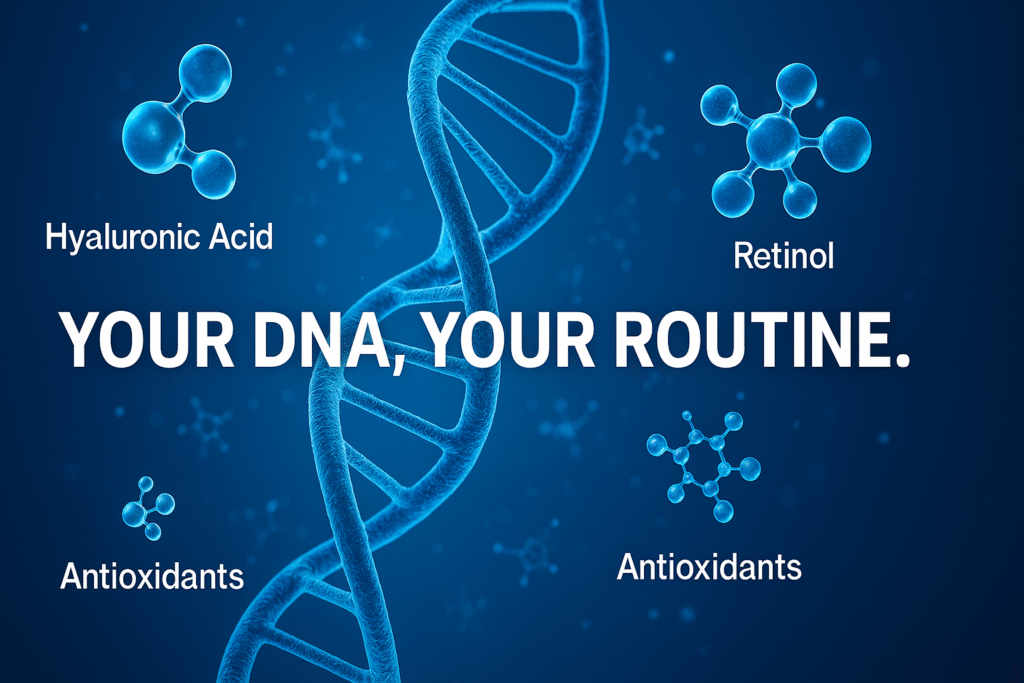
Try This: ALLÉL DNA-Matched Skincare
ALLÉL, a Swedish startup founded by dermatologists, offers a clinical DNA test that examines 16 genetic markers related to skin ageing, such as photoaging, oxidative stress, inflammation, and collagen breakdown. After a cheek swab, results arrive in about a week.
Based on that data, ALLÉL formulates a bespoke routine—typically comprising a serum, moisturiser, eye cream, and supplements—designed to address your specific genetic needs. Users have reported noticeable improvements within one to two weeks.
Also In the Market: SkinDNA
Another option is SkinDNA by DNA Power. It analyses similar genetic markers across five skin categories: firmness, glycation, UV resistance, free radical response, and elasticity.
The test is available globally (with prices ranging from CAD 149 to CAD 249). It provides a personalised skincare profile, suggesting which active ingredients (such as antioxidants or collagen boosters) are most or least effective for your genetics.
Reality Check & Growth Potential
- Access: Both ALLÉL and SkinDNA require a cheek swab and dermatological or laboratory processing, which typically takes a few weeks.
- Cost & Debate: These services are premium-priced, and the scientific community is still exploring how much DNA alone should influence skincare choices.
- Market Trend: However, this niche is growing quickly—by 2030, the global DNA-based skincare market is projected to reach over US$11 billion, with major players like ALLÉL, SkinDNA, Caligenix, and others already in the game
The Ethics of an AI Skincare Routine
Behind the tech lies a quiet ethical crisis — and FanalMag believes this conversation is as meaningful as the science.
Bias in AI Datasets
Most early AI skincare tools were trained on lighter skin tones, leading to misdiagnoses for individuals with darker complexions.
Haut.AI and L’Oréal have since launched inclusive datasets; however, a representation gap still exists, particularly for African, South Asian, and mixed-race skin tones.
Privacy & Data Security
AI skincare isn’t just reading your skin — it’s collecting biometric data. GDPR regulators are now tightening controls over where and how companies store this information. FanalMag recommends:
- Check whether your AI skincare app encrypts images.
- Avoid services lacking transparent data policies.
- Be cautious with free apps — your skin data could be sold.
Sustainability: Less Waste, Smarter Products
AI-powered personalisation reduces overproduction: Companies like Upcircle Beauty utilise AI to optimise dosage and packaging, thereby cutting their carbon footprints. Instead of buying six moisturisers, one precise formulation meets your needs.
Robot-Blended Cosmetics & On-Demand Formulations
In Korea, AmorePacific’s AI-driven labs now enable customers to blend foundations and lipsticks in real-time using robotic mixers. Meanwhile, SmartSKN and K-OWN are pioneering 3D-printed skincare creams tailored to your hydration levels and barrier health.
By 2028, AI-powered formulation devices are projected to generate $5 billion in annual revenue, making on-demand beauty labs a mainstream phenomenon.
The Future of AI Skincare Routine: Where We’re Headed
Within the next three years, expect:
- Portable AI dermatology scanners — handheld devices as accurate as clinic machines.
- Neural-powered personalised routines — daily recommendations based on your diet, stress, and environmental exposure.
- AI-powered “longevity skincare” — predictive algorithms that simulate how your skin will age under different conditions.
This is not just about beauty anymore — it’s about skin health, wellness, and precision medicine.
What’s Coming: Smarter Ingredient Matchmakers
AI is moving toward not just recommending products, but also helping you avoid problematic ingredients.
While some platforms, such as Haut.AI and Revieve, are building advanced models to match skincare to skin types, emerging research is exploring how to train AI on user outcomes, tracking how skin responds to specific ingredient combinations over time.
This could soon enable your AI assistant to warn you if, for example, niacinamide and retinol might over-stress your skin barrier based on your profile.
Conclusion: AI Is Your New Skincare Partner
AI skincare is entering its golden age — blending biotech, computer vision, and robotics into tools that are reshaping how we care for ourselves. But this power demands responsible design, diverse representation, and transparent ethics.
At FanalMag, we believe the future isn’t about replacing dermatologists — it’s about empowering individuals with data and technology to make better, smarter, and safer skincare decisions.
Your skin is the interface between you and the universe — and AI is helping us finally read the code.
Final Tips to Get Started with AI Skincare Routine
Ready to level up your skincare routine? Here’s a simple path to get started using AI tools that are already making skincare more thoughtful and more personal:
- Start Simple: Use YouCam Makeup or Troveskin to scan your skin and understand your current condition—spots, wrinkles, hydration, and more.
- Go Deeper: For hyper-personalised analysis, try Haut.AI or L’Oréal Skin Genius. These tools generate routines tailored to your skin type, environment, and goals.
- Upgrade Your Tools: Add an AI-powered device like the LUNA fofo for smart cleansing that adapts to your skin’s needs in real time.
- Decode Ingredients: Use INCI Decoder to check what’s in your products and ensure ingredient compatibility.
- Stay Weather-Aware: If available in your region, try tools like L’Oréal’s exposome tracker (via BreezoMeter) to adjust your skincare based on UV and pollution data.
FAQs ( Frequently Asked Questions)
As AI skincare transitions from a futuristic idea to a daily reality in 2025, readers often have questions about how it actually works. From the safety of AI-powered skincare apps to the effectiveness of smart mirrors and personalised beauty tools, these FAQs address the most common concerns.
Whether you’re curious about the science, the privacy of your data, or the affordability of these devices, this section breaks down the essentials in simple terms.
1. What is AI-powered skincare?
AI-powered skincare refers to beauty tools and apps that use artificial intelligence to analyse your skin, track changes, and recommend personalised skincare routines. These devices can detect issues such as dryness, wrinkles, or dark spots and provide personalised solutions.
2. Are AI skincare devices safe to use?
Yes. Most AI skincare tools, such as smart mirrors and cleansing brushes, are non-invasive and approved for consumer use. They don’t alter your skin directly but guide you in choosing the proper care. Always pair them with a dermatologist’s advice for the best results.
3. How accurate are AI skincare apps and smart mirrors?
Accuracy depends on the device and its training data. Leading tools like HiMirror and Haut.AI apps are trained on thousands of skin images, allowing them to detect issues with impressive precision. Still, they are designed to support, not replace, professional dermatology.
4. Can AI really personalise my skincare routine?
Yes. AI tools use your skin data (hydration, age, texture) plus external factors like weather or UV index to build a personalised skincare plan. Devices like the LUNA fofo even adjust cleansing intensity in real time based on your skin’s condition.
5. Do I need expensive equipment for AI skincare?
Not necessarily. While high-end smart mirrors can cost several hundred dollars, many affordable AI skincare apps are free or under $100. Devices like the LUNA fofo (around $89) bring advanced AI-powered care within reach for most users.
6. Will my skin data be private?
Most reputable AI skincare companies comply with data protection laws, such as the GDPR. They anonymise or encrypt your skin data, but it’s always wise to check the privacy policy before syncing apps. Data privacy is a key concern in personalised skincare AI.
7. Is AI skincare the future of beauty?
Definitely, the global AI beauty market is projected to grow rapidly through 2025 and beyond. With more innovative devices, more accurate predictions, and integration into daily routines, AI skincare is set to become as common as moisturisers in the beauty industry.

